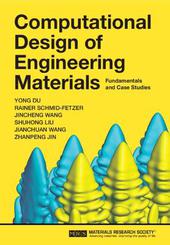
|
Computational Design of Engineering Materials: Fundamentals and Case Studies
Hardback
Main Details
| Title |
Computational Design of Engineering Materials: Fundamentals and Case Studies
|
| Authors and Contributors |
By (author) Yong Du
|
|
By (author) Rainer Schmid-Fetzer
|
|
By (author) Jincheng Wang
|
|
By (author) Shuhong Liu
|
|
By (author) Jianchuan Wang
|
| Physical Properties |
|
| Category/Genre | Materials science
Mathematical theory of computation |
|---|
| ISBN/Barcode |
9781108494106
|
| Classifications | Dewey:620.110285 |
|---|
| Audience | | Tertiary Education (US: College) | |
|---|
| Illustrations |
Worked examples or Exercises
|
|
Publishing Details |
| Publisher |
Cambridge University Press
|
| Imprint |
Cambridge University Press
|
| NZ Release Date |
28 February 2023 |
| Publication Country |
United Kingdom
|
Description
Introducing state-of-the art computational methods, this book combines detailed explanations with real-world case studies to give a full grounding in the design of engineering materials. This book presents a wide spectrum of key computational methods, such as CALPHAD-method, first-principles calculations, phase-field simulation and finite element analysis, covering the atomic-meso-macro scale range. The reader will see these methods applied to case studies for steel, light alloys, superalloys, cemented carbides, hard coating and energy materials, demonstrating in detail how real-world materials are designed. Online ancillary material includes input files for computational design software, providing the reader with hands-on design experience. Step-by-step instructions will allow you to perform and repeat the simulations discussed in the book. Aimed at both graduate and undergraduate students as well as non-specialist researchers in materials science and engineering, including ceramics, metallurgy, and chemistry, this is an ideal introductory and reference book.
Author Biography
Yong Du is a full professor at Central South University (CSU), China, and is the Chinese Director for two Sino-German cooperation groups 'Microstructure in AI alloys' and 'Integrated Computational Materials Engineering of Electrochemical Storage Systems' as well as Vice Director of State Key Laboratory of Powder Metallurgy at CSU. Currently he is an associate editor of CALPHAD, associate editor of J. Phase Equilibria and Diffusion, and serves on the Advisory Board of International Journal of Materials Research (formerly Z. Metallkd.). Rainer Schmid-Fetzer is Professor Emeritus at Clausthal University of Technology, Germany. He is Fellow of ASM International and awardee of both the Hume-Rothery Prize, IOM3, UK, and William Hume-Rothery Award, TMS, USA. He is an associate editor of J. Phase Equilibria and Diffusion, and serves on the Advisory Board of International Journal of Materials Research. Jincheng Wang is a professor at State Key Laboratory of Solidification Processing, Northwestern Polytechnical University, China. Shuhong Liu is a professor at CSU. She is a recipient of the best paper prize of the Alloy Phase Diagram International Commission. Jianchuan Wang is an Associate Professor at CSU. He received a Scholarship Award for Excellent Doctoral Student from the Ministry of Education of China. Zhanpeng Jin was an Academician of Chinese Academy of Sciences. He was the Associate Editor of CALPHAD, Advisory Board member of Journal of Phase Equilibria and Diffusion, and a member of Asia Pacific Materials Assembly.
Reviews'Computational Design of Engineering Materials - an ambitious title for an ambitious book! But the authors match that expectation! They carefully explain atomistic models like density functional theory and molecular dynamics simulations before going to mesoscale approaches like cellular automaton, the CALPHAD, multi-phase-field and the phase-field-crystal methods. This fundamental part of the book is complemented by several chapters addressing case studies. They are selected from different materials like steels, Al- and Mg-alloys and superalloys and also from examples of different applications like hard coatings or energy materials. The book concludes with a section on future development focusing on ICME (Integrated Computational Materials Engineering) and MGI (Materials Genome Initiative). A 'must have' for students and engineer of the material community.' Georg J. Schmitz, Access e.V
|